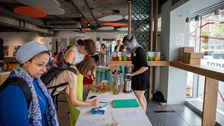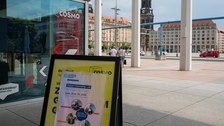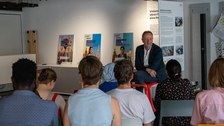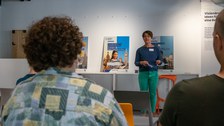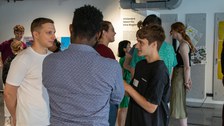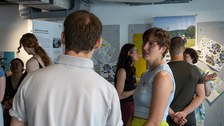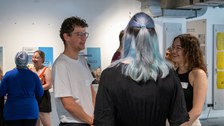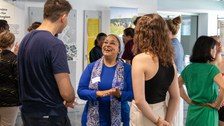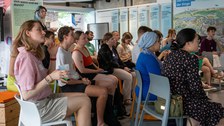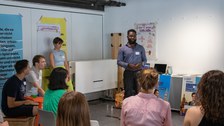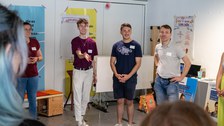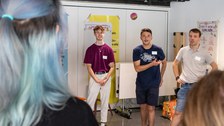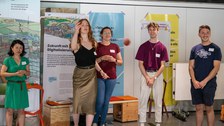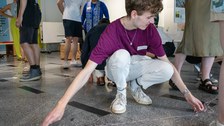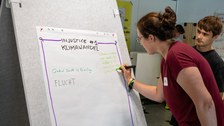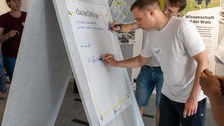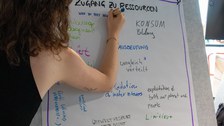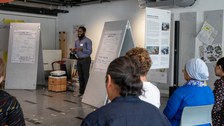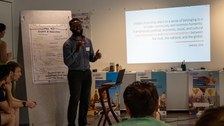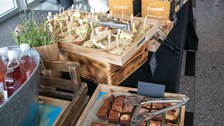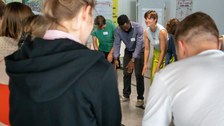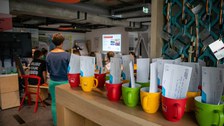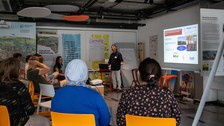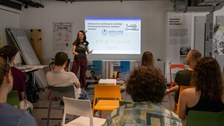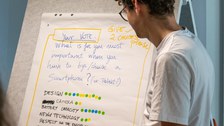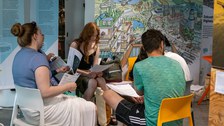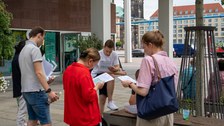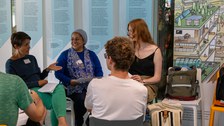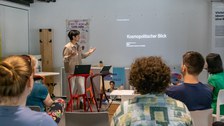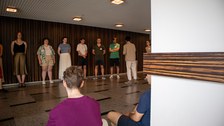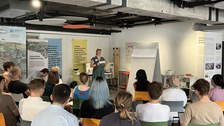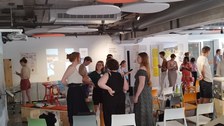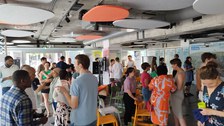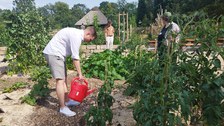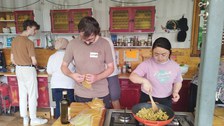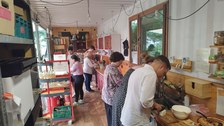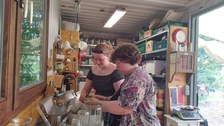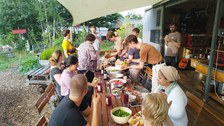Jul 29, 2024
Report: Great kick-off! - First TUD Global Citizenship Lab is multi-perspective, energetic and successful
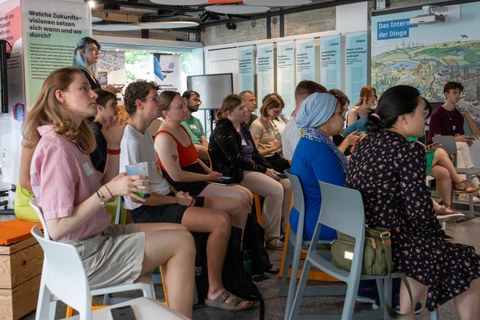
Participants of the TUD Global Citizenship Lab in summer semester 2024
Report on the TUD Global Citizenship Lab in the summer semester 2024
Great kick-off! - First TUD Global Citizenship Lab is multi-perspective, energetic and successful.
On 28.06. and 29.06.2024 the TUD Global Citizenship Lab took place for the first time. We look back with pleasure on an exciting and successful event.

Participants of the TUD Global Citizenship Lab in the summer semester 2024
More than 40 participants, including committed students, doctoral candidates from various disciplines as well as internal and external TUD experts and stakeholders from a wide range of fields, organizations, countries and cultures, came together in the COSMO Wissenschaftsforum (Science Forum) to approach the topic of Global Citizenship Education (GCED) together, to network and to act.
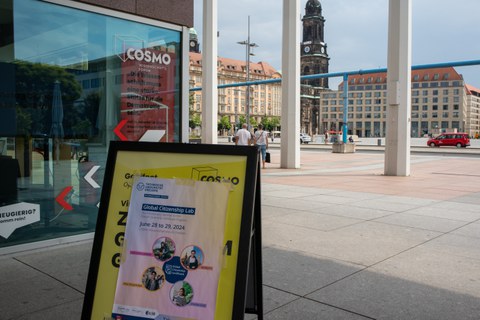
COSMO Wissenschaftsforum (Science Forum)
The location for the two-day lab could not have been more fitting than the COSMO Wissenschaftsforum in the Kulturpalast am Altmarkt. The forum acts as a link between science and urban society and, thanks to its open and flexible character, invites people to meet and collaborate.
What contributes to the mind- and skillset of a global citizen?
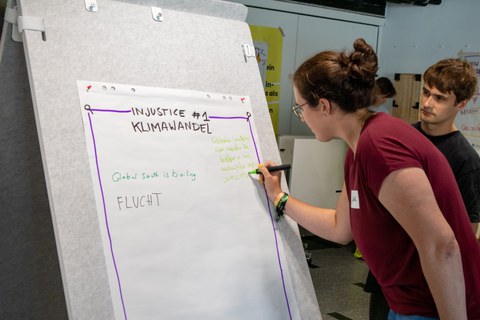
Workshop on the topic of Global Citizenship Education
In various interactive sessions, the topics "Multilingualism and Global Citizenship Education" (Dr. Rachel Bowden, ZLSB, TUD), "Global Learning, (Post)Colonialism and Global Citizenship" (Maria Nelz, aha - anders handeln e.V./ Peter Che Nfon - founder of Sustainable Actions Africa), "Resource Injustice using the Example of Mining and the Smartphone" (Oscar Choque, Ayni - Verein für Ressourcengerechtigkeit e.V./ Francesca Piccinotti, arche noVa - Initiative für Menschen in Not e.V..) and "Cosmopolitan perspective and an attitude critical of discrimination and racism" (Hàochéng Lóu, Dachverband der Migrant:innenorganisationen in Ostdeutschland) were discussed.
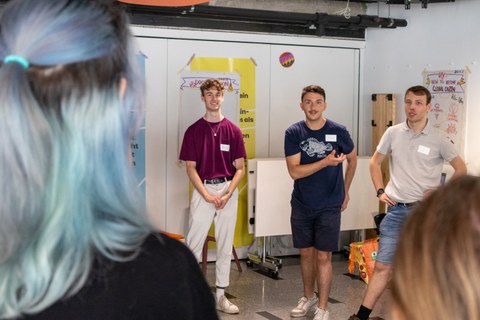
Exercises to loosen up
Learning and testing useful tools and skills using the peer-to-peer approach was also at the heart of the program: the peer counselling method for focused and pattern-breaking solution-seeking (Klara-Johanna Fabisch, tuuwi, TUD), SMART for motivating, tangible and actionable goal pursuit (Marlene Maria Schreiber, reflected.committed - doing sustainability (Integrale, TUD)) and the Match Maker program as a compass for selecting the right university groups for student engagement (Lea Hummitzsch, Integrale - Institut für studium generale, TUD).
In order to involve all participants equally, the lab was held bilingually in English and German with support in other languages.
Networking, practice, community and outreach
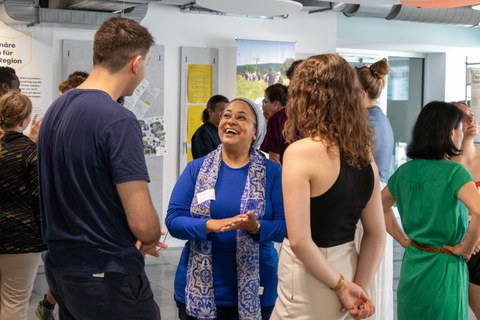
Exchange in the pitch and network meeting
Another highlight of the lab was the extremely lively and informative pitch and networking session on Saturday. Committed representatives from TU Dresden and urban society shared insights into their organizations, initiatives, projects and fields of activity and then engaged in conversation with the participants.
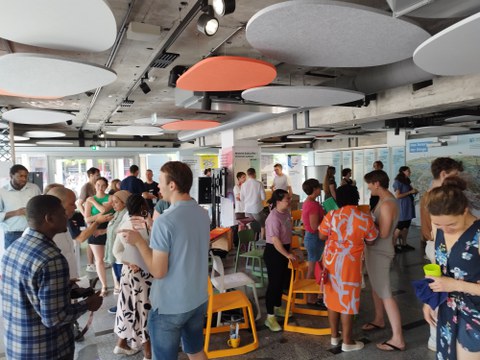
Pitch and networking meeting
Participants included experts from civil society ("Sauberes Dresden" ("Clean Dresden") campaign and NGO Cradle to Cradle Saxony; aha - anders handeln e.V. Ingenieure ohne Grenzen (Engineers Without Borders); climatechallenge), stakeholders from TU Dresden (Alumni Network and Regional Ambassadors; CIPSEM) and representatives from the International Office (TUD Internationalization Award; International Tutorial Program; Cultural Office; Scholarship Programs for International Students; Student Mobility Programs (including ERASMUS) and Buddy Program GSW; EUTOPIA).
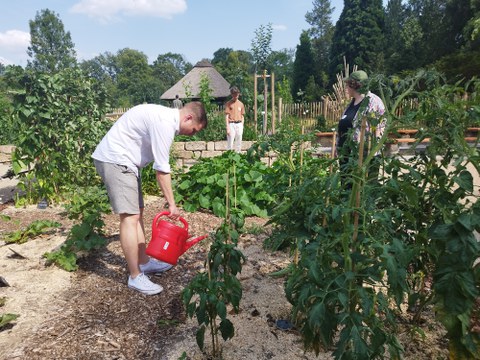
Practical work in the Botanical Garden in the "BildungsAcker" project
The lab concluded with two practical assignments, which emphatically underlined the importance of bringing together knowing/knowing and doing/acting. Despite the summer heat, the first assignment took place in the Botanical Garden's teaching and school garden with a lot of enthusiasm from the participants, accompanied by student employees in the ESD project "BildungsAcker" (team Prof. Jana Markert, TU Dresden).
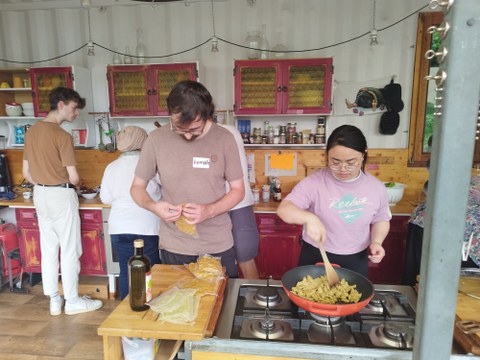
Cooking together in the Alte Gärtnerei
Later, an excursion led to the Alte Gärtnerei (old nursery) in Dresden Pieschen. During a mindful guided tour by Sebastian Kaiser, one of the founders of the nursery, the participants not only got to know a piece of permaculture, but also the multi-layered transformative history and the concept of participatory district development behind the nursery.
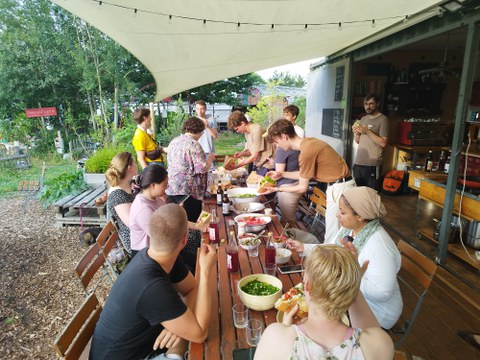
Dinner together in the Alte Gärtnerei
The evening was rounded off with cooking together, a social get-together and a unifying round of reflection. At the end of the two days, new interpersonal connections, valuable "seeing" and "listening" to each other as well as a tender and solidary affiliation among the participants were noticeably created. The social-emotional learning and growing together is the best testimony to a successful educational event.
What comes after the Lab?
Following the lab, the first generation of future TUD-empowered global citizens will reflect on the insights they have gained and develop a personal roadmap to global citizenship. However, the participants are not alone, but can benefit from the new community that has formed during the two days spent together. Exchange and mutual support are key to a globally oriented and locally engaged GCC community.
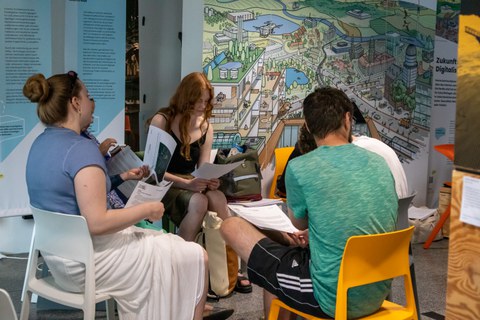
Benefit from the community
In order to maintain, strengthen and build this community, further events are planned for the future. The TUD Global Citizenship Lab itself is offered as a mandatory introductory event of the TUD Global Citizenship Certificate (GCC) every semester.
Find out more about the TUD Global Citizenship Certificate
The certificate programme developed by the International Office of TU Dresden (Internationalization@Home department) is an active contribution of TU Dresden to the implementation of the Sustainable Development Goal 4 coordinated by UNESCO, which aims to ensure equitable and quality education for all people worldwide and throughout their lives.
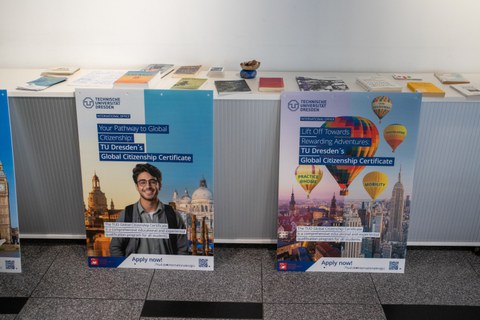
The GCC posters were shown in advance on the TUD campus
The GCC program is aimed at all students and doctoral candidates (including exchange students) at TU Dresden, promotes and recognizes their intercultural and global competencies, experiences and local-global commitment. It certifies that, in addition to their studies, participants have acquired the knowledge and skills to grasp global challenges in an interdisciplinary, holistic manner and in their ethnic dimensions and to meet them with commitment and competence.
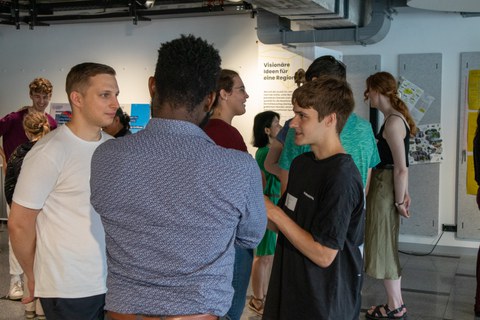
Intensive exchange in joint discussions
With GCC as experience, proof of qualification and award, the prospective TUD graduates are well equipped for their personal development, their effectiveness in the international and global environment, their academic success in a comprehensive sense and for a strong and responsible future!
Join the next GCC-Lab!
We would like to thank you very much for all the support, big and small, that we have received and that has helped to make our lab a great success after intensive joint planning and cooperation.
We are looking for support and input for the next TUD Global Citizenship Lab in the winter semester 2024/2025. Feel free to contact us. We look forward to a cooperation and many exciting contributions.
Until then, best regards from the GCC team at TU Dresden.
The TUD Global Citizenship Lab in the summer term 2024 took place as a two-day block event on
- Friday, June 28, 2024 (9 am - 5 pm)
- Saturday, June, 29, 2024 (9 am - 8 pm)
at the COSMO Science Forum, Schlosstraße 2 (at the Altmarkt) in Dresden.
We spent the afternoon and evening of Saturday in the Botanical Garden (Stübelallee 2, 01307 Dresden) and in the Alte Gärtnerei ( Dresden-Pieschen, Heidestraße, ggü 21, 01127 Dresden).
| Expert | Teaser |
|---|---|
|
Ms Dr. Rachel Bowden is ESD consultant at the Center for Teacher Education and Educational Research ZLSB where she coordinates the ESD State Initiative and an Erasmus+ Teacher Academy ("Teacher Academy Project – Teaching Sustainability“ (TAP-TS)). Her research interests include multilingual education, ESD, and teacher education. |
Multilingualism and Global Citizenship Education How do you picture your own multilingualism? What has multilingualism got to do with Global Citizenship and sustainability? As we address these questions, we will explore and contrast research-based insights around multilingualism as a social and neurological phenomenon and ‘monoglossic ideology’, which dominates language policies in schools and universities. We will discuss strategies for moving out of ‘linguistic boxes’ and some implications for sustainability and Global Citizenship Education. |
|
Mr Dipl. Ing. M. Sc. Oscar Choque from the AYNI-Verein für Ressourcengerechtigkeit e.V. is a One World Promoter specializing in resource justice in Saxony. He grew up in a mining village in Bolivia and worked there as a miner. He studied in Russia and Germany. His work focuses on the effects of conventional mining and lithium extraction in Latin America (Chile, Bolivia, and Argentina). |
Human Rights Violations and Environmental Destruction in the Mining Industry – the Downside of Prosperity Digitalization and electromobility are on the rise in industrialized countries, resulting in a massive increase in raw materials consumption. For instance, Germany is almost 100 percent dependent on imports of metal ores. What strategy is Germany's raw materials policy pursuing? Where do the raw materials come from? Who mines them? How does mining impact people and nature in the global south? What about the question of resource distribution and resource justice? What alternative courses of action are there? |
|
Ms Klara-Johanna Fabisch is a Master's student in Spatial Development and Natural Resource Management at the TUD, a committed member of tuuwi (TU Environmental Initiative), and coordinator of its student teaching programs such as the Environmental Ring Lectures. |
Peer Counseling In peer counseling, you will get to know a tool to support each other. This tool can be a good assistant to you in mastering all modules of the program (TUD Global Citizenship Certificate). We will be collecting possible solutions to problems in your very authentic work or life context. We will work constructively with the diversity of the group in terms of point of view, knowledge, and experiences to generate new impulses and ideas. |
|
Ms Lea Hummitzsch is the Project Manager for the "dies academicus" at the Integrale - Institute for studium generale of the TU Dresden. Ms Marlene Maria Schreiber is part of the team of reflektiert.engagiert - doing sustainability. |
MatchMaker Program How can you pursue your interests at the university, yet beyond lectures and seminars? TUD's university groups offer you a wide range of opportunities to get involved socially, politically, or ecologically, to expand your practical knowledge and skills as well as to widen your social circle. You have no idea where to go and to contribute? Our MatchMaker will give you initial guidance based on your interests so that you can find out more. How can you successfully achieve your goals? Set them SMART! With the SMART method, you will learn a particularly effective technique for formulating clear and achievable goals and reaching them successfully. |
| Mr Hàochéng Lóu, M. A. 娄颢程 in Intercultural Communication and Intercultural Competence, anti-racism consultant at the umbrella organization of migrant organizations in East Germany (DaMost), Youtuber (Haocheng Lou#Cosmopolitan). |
Broadening your Horizons: How to see the World through the eyes of a Cosmopolitan? In China, people eat dogs and bats; in East Germany, public nude swimming is common. How unpleasant and unhygienic must it be for people in India to eat with their hands, right? Is it in deed coincidental that terrorism and civil wars frequently erupt in predominantly Islamic regions? How horrible does Mongolian throat singing sound? Our view of the world is constantly shaped by prejudices. On the one hand, preconceptions help us to deal with things that are still unfamiliar more efficiently. On the other hand, if we fail to challenge and correct them, they can cloud our perception of new things. Bias prevents us from engaging with others and their cultural practices on an equal footing, from reflecting on our own actions and thinking about them, and from seeing ourselves as equal inhabitants of this planet or equal Global Citizens. Adopting a cosmopolitan perspective requires openness and the ability to expose our world view to irritations in order to overcome ourselves. Let's take a closer look at some cultural practices, stretch their potential for irritation – even provocation –, and explore how to cultivate an attitude of impartiality. We would also discuss how to recognize and cope with the limitations of this approach. Let’s broaden our horizons and enjoy the richness of intercultural and interpersonal diversity this world is offering! |
|
Ms. Maria Nelz, M. Sc., a tropical forester by profession and a human by passion, coordinates a Dresden-based NGO (Global Learning Education Center by aha - anders handeln e.V.) that is committed to facilitating Education for Sustainable Development through local cooperation. Maria´s mission is to promote lifelong learning and thus to support Dresdeners – whether young or old – to integrate into a global and pluralistic society. Mr. Peter Che Nfon, M. Eng. is the founder of Sustainable Actions Afrika, a non-profit NGO dedicated to promoting education for sustainable development through glocalized actions. Besides his teaching experience of over six years, he also works as an anti-black racism trainer, demonstrating his commitment to racial justice and global citizenship. |
DIY – HOW TO … become a Global Citizen You are a global citizen – and not aware of it yet? Are you looking for a manual on how to activate your Global Citizenship mindset? Well, then you are exactly the right one here! Together we will be exploring whether Global Citizenship is only about the frontiers in our mind, or physical and territorial borders as well. We will delve into our colonial history, and reflect on the relation between power and responsibility. At the end of the journey, you will be able to take along a handful of global mindfulness with you on your very own path to Global Citizenship. |
|
Mr. Sebastian Kaiser is a permaculture designer, founding member, and part of the executive board of the Alte Gärtnerei in Dresden-Pieschen. In addition to permanent gardening and building on the land, he is interested in questions regarding urban development from the grassroots, land justice in the context of mobility issues, good life, and Italian cuisine. |
Applied transformation in practice - the Alte Gärtnerei During an explorative guided tour, you will get to know your interests as well as the place itself. Afterward, there will be room for questions and exchange of ideas you may have over a jointly prepared dinner on the terrace. |
|
Ms Freya Sternkopf, M.Sc. is a Research Associate at the Institute of Waste Management and Circular Economy TUD, a representative of the TU Dresden and the NGO Cradle to Cradle Saxony in the "Clean Dresden" campaign. |
Against Cigarette Butts, and for a Clean Dresden Cigarette butts lying around are annoying. They look awkward; it is pricy and time-consuming to remove them. And, contrary to what many smokers may expect, they don't disappear by themselves! But that's not all. Cigarette butts are highly toxic. This is not only alarming to me, the mother of a one-year-old daughter who is thrilled by everything lying on the ground and will examine it with great curiosity (occasionally even with her mouth), but animals also get poisoned by the stubs. In the worst cases, even fires can be caused by casually flipping them away with the attitude of “out of sight, out of mind”. The fight against cigarette butts is nevertheless more challenging than one would imagine in the face of these dangers. So, why is that so, and how can we make a change? A broad alliance of municipal institutions and NGOs in Dresden is working together to raise awareness and campaigning against the problem. I am a representative of the NGO Cradle to Cradle Saxony and the TU Dresden (Institute for Waste and Circular Economy), and would be delighted to be joined by fellow campaigners! |
- And others...
Other participating and/or input-giving persons, projects, and organizations
- Representatives of the International Office TU Dresden: Cultural Office, Erasmus program, scholarship programs for international students, international tutoring program
- Representatives of the TU Dresden EUTOPIA team and EUTOPIA Certificate of Internationalization
- Representatives of the Green Office TU Dresden
- Participating experts from Global South in the UNEP/UNESCO/BMUV International Postgraduate Course on Environmental Management for Developing Countries at the Centre for International Postgraduate Studies of Environmental Management (CIPSEM)
- Representatives of BildungsAcker, a place of learning for practical education for sustainable development (ESD)
- Representatives of Genderkompetenzzentrum Sachsen
- Representatives of Botanischer Garten TU Dresden
- International regional ambassadors from TU Dresden
- Other stakeholders from civil society
The Global Citizenship Lab took place on June 28 and 29 at the COSMO Science Forum Dresden. The Lab is part of the TUD Global Citizenship Certificate (GCC) program. © TUD/ZLSB/IO
Some impressions of the lab:
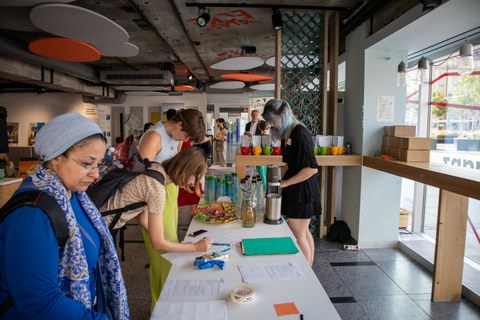
Arrival at the TUD Global Citizenship Lab in summer semester 2024 © TUD/ZLSB/IO
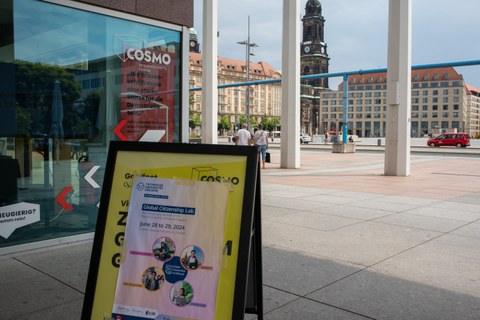
COSMO Wissenschaftsforum (Science Forum) in the Kulturpalast am Altmarkt © TUD/ZLSB/IO
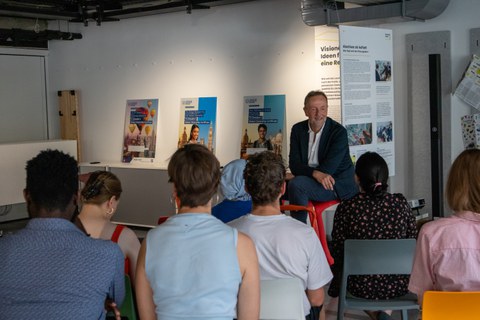
Opening of the lab by Peter Rosenbaum, Head of the International Office of TU Dresden © TUD/ZLSB/IO
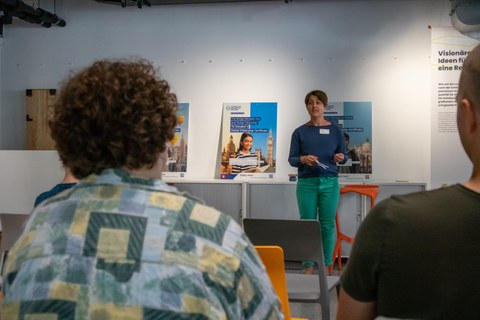
Dr. Rachel Bowden (ZLSB, TUD) speaks on the topic of "Multilingualism and Global Citizenship Education" © TUD/ZLSB/IO
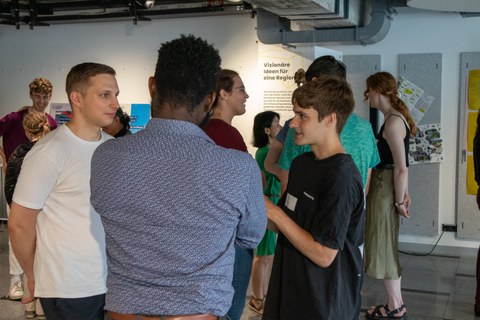
Intensive exchange in joint discussions © TUD/ZLSB/IO
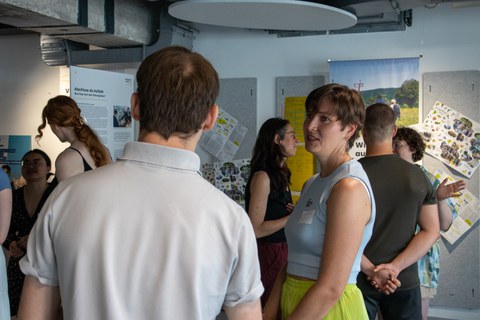
Intensive exchange in joint discussions © TUD/ZLSB/IO
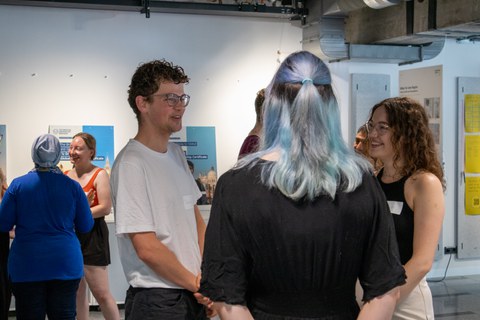
Intensive exchange in joint discussions © TUD/ZLSB/IO
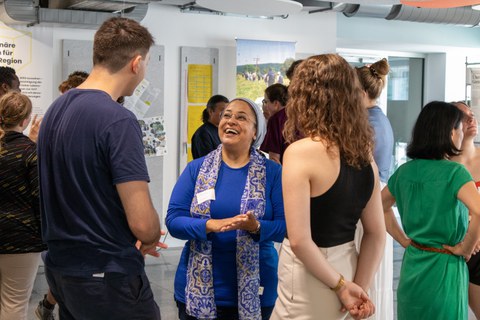
Intensive exchange in joint discussions © TUD/ZLSB/IO
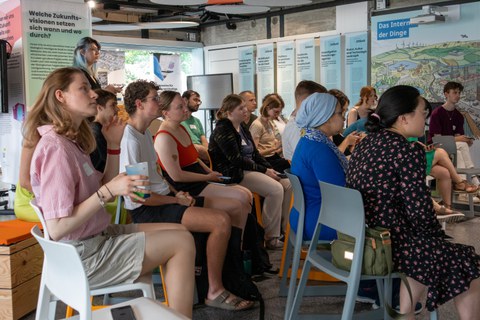
Participants of the TUD Global Citizenship Lab in summer semester 2024 © TUD/ZLSB/IO
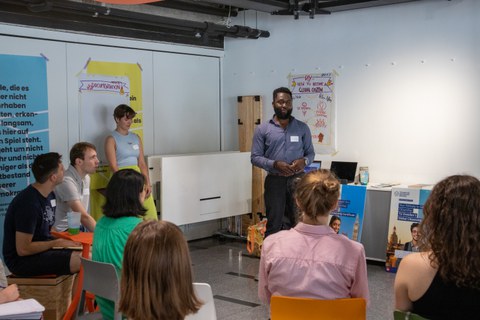
Workshop on "Global Learning, (Post)Colonialism and Global Citizenship" with Maria Nelz and Peter Che Nfon (aha - anders Handeln e.V.) © TUD/ZLSB/IO
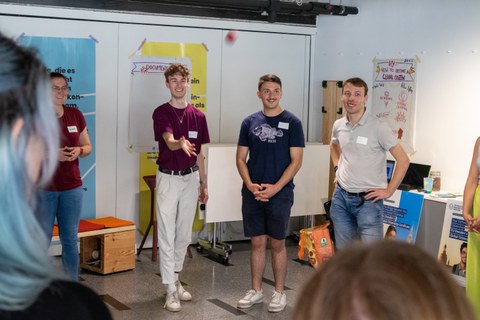
Exercises to loosen up the workshop © TUD/ZLSB/IO
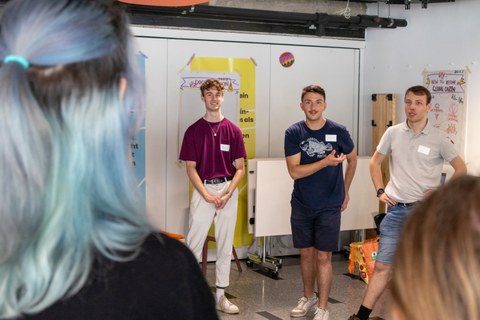
Exercises to loosen up the workshop © TUD/ZLSB/IO
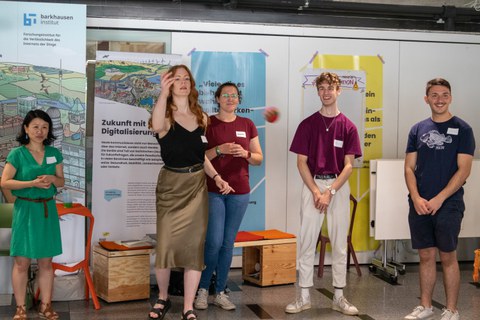
Exercises to loosen up the workshop © TUD/ZLSB/IO
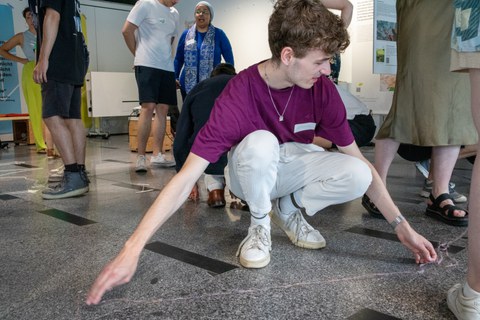
Interactive exercise Worldmapping © TUD/ZLSB/IO
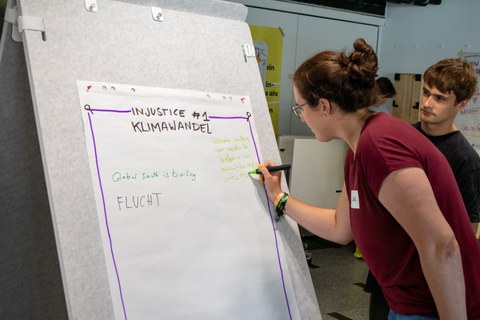
Workshop on "Global Learning, (Post)Colonialism and Global Citizenship" with Maria Nelz and Peter Che Nfon (aha - anders Handeln e.V.) © TUD/ZLSB/IO
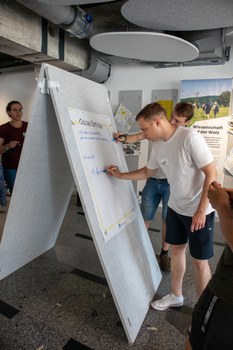
Workshop on "Global Learning, (Post)Colonialism and Global Citizenship" with Maria Nelz and Peter Che Nfon (aha - anders Handeln e.V.) © TUD/ZLSB/IO
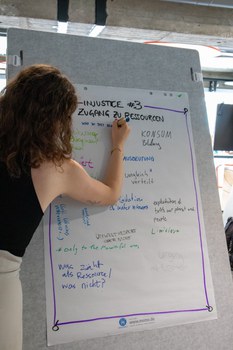
Workshop on "Global Learning, (Post)Colonialism and Global Citizenship" with Maria Nelz and Peter Che Nfon (aha - anders Handeln e.V.) © TUD/ZLSB/IO
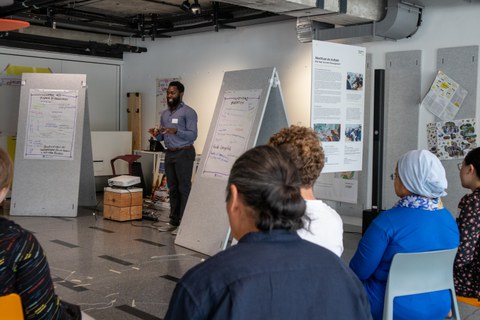
Workshop on "Global Learning, (Post)Colonialism and Global Citizenship" with Maria Nelz and Peter Che Nfon (aha - anders Handeln e.V.) © TUD/ZLSB/IO
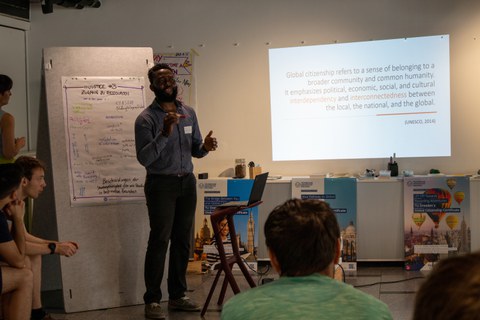
Workshop on "Global Learning, (Post)Colonialism and Global Citizenship" with Maria Nelz and Peter Che Nfon (aha - anders Handeln e.V.) © TUD/ZLSB/IO
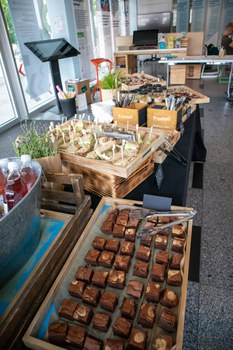
Food was also provided © TUD/ZLSB/IO
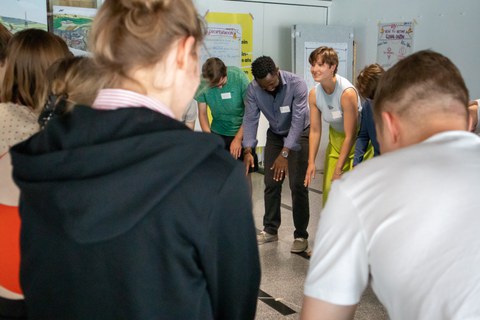
Exercises to loosen up the workshop with Maria Nelz and Peter Che Nfon (aha - anders Handeln e.V.) © TUD/ZLSB/IO
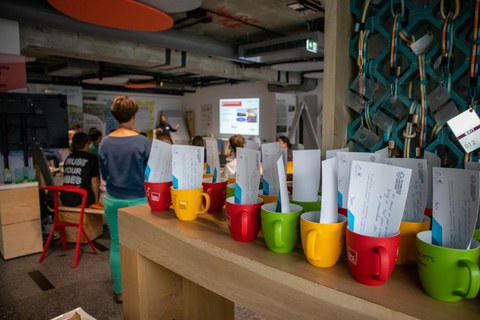
Many thanks to all our contributors © TUD/ZLSB/IO
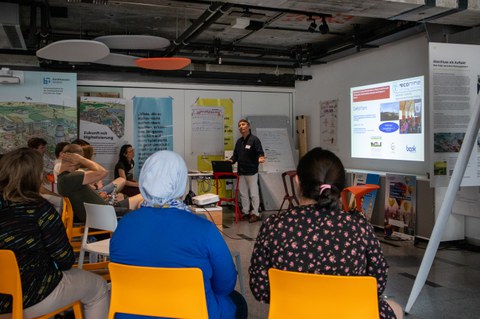
Workshop on the topic of "Resource injustice using the example of mining and the smartphone" by Oscar Choque and Francesca Piccinotti (Ayni - Verein für Ressourcengerechtigkeit e.V./arche noVa - Initiative für Menschen in Not e.V.) © TUD/ZLSB/IO
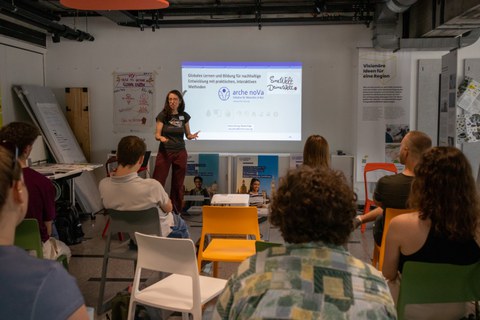
Workshop on the topic of "Resource injustice using the example of mining and the smartphone" by Oscar Choque and Francesca Piccinotti (Ayni - Verein für Ressourcengerechtigkeit e.V./arche noVa - Initiative für Menschen in Not e.V.) © TUD/ZLSB/IO
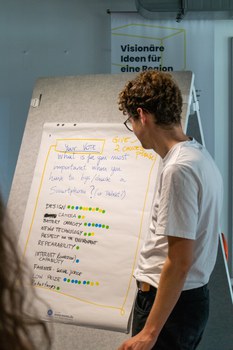
Workshop on the topic of "Resource injustice using the example of mining and the smartphone" by Oscar Choque and Francesca Piccinotti (Ayni - Verein für Ressourcengerechtigkeit e.V./arche noVa - Initiative für Menschen in Not e.V.) © TUD/ZLSB/IO
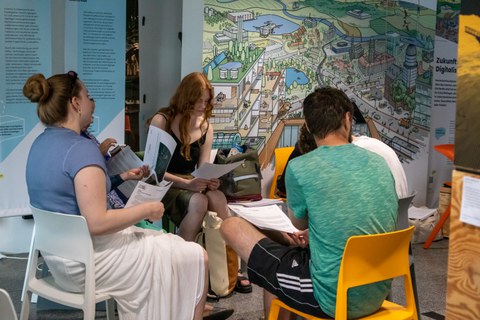
Benefit from the community © TUD/ZLSB/IO
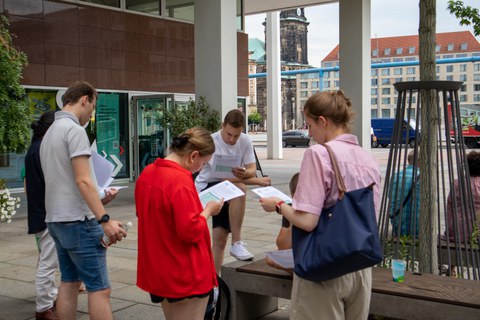
The area outside the Kulturpalast was also suitable for group work © TUD/ZLSB/IO
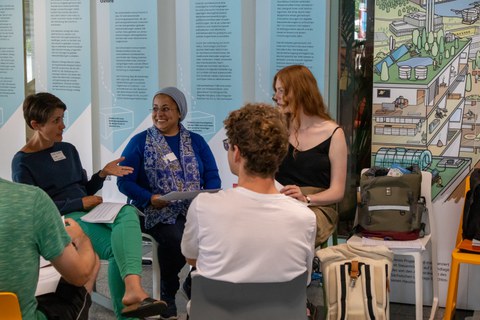
Intensive exchange in joint discussions, here with Dr. Rachel Bowden (ZLSB, TUD) © TUD/ZLSB/IO
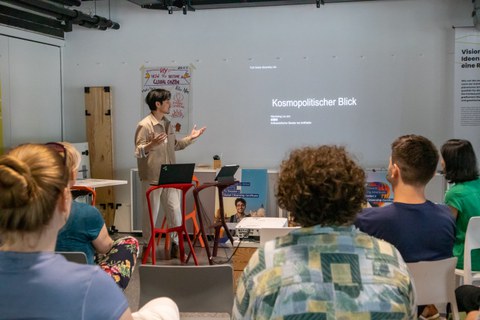
Workshop on the topic “Cosmopolitan perspective and attitude of anti-discrimination and anti-racism” with Hàochéng Lóu (Dachverband der Migrant:innenorganisationen in Ostdeutschland) © TUD/ZLSB/IO
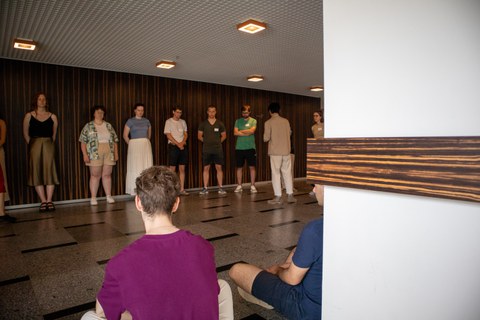
Group formation exercise with eyes closed © TUD/ZLSB/IO
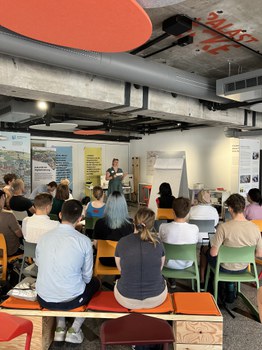
Interactive presentation and application of the peer counseling method with Klara-Johanna Fabisch (tuuwi, TUD) © TUD/IO
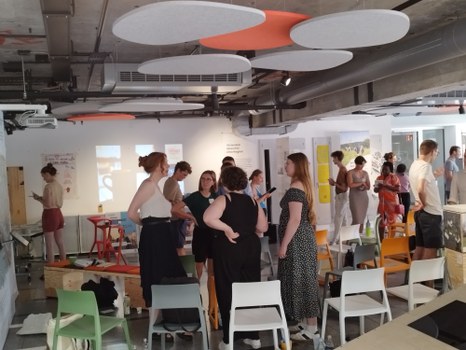
Intensive exchange in the pitch and networking meeting © TUD/IO
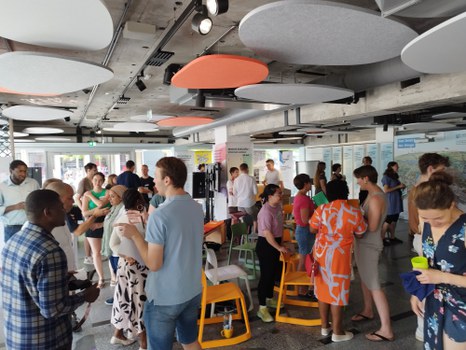
Intensive exchange in the pitch and networking meeting © TUD/IO
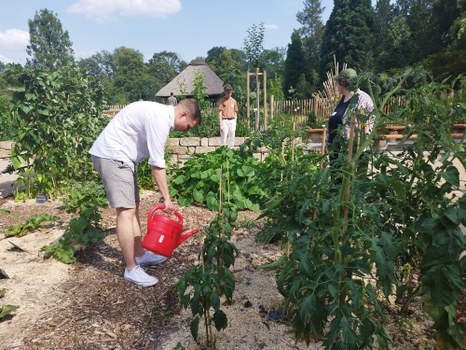
Joint practical work in the Botanical Garden in the "BildungsAcker" project © TUD/IO
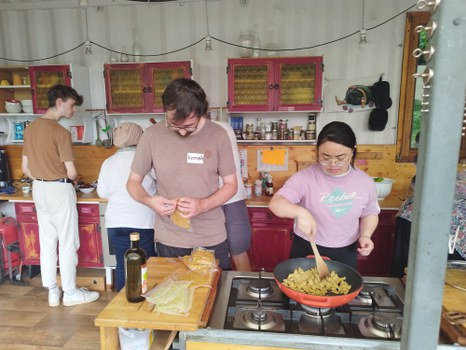
Cooking together in the Alte Gärtnerei © TUD/IO
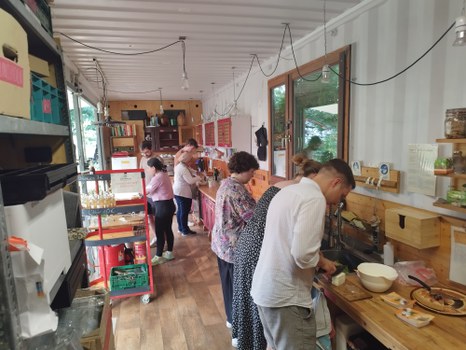
Cooking together in the Alte Gärtnerei © TUD/IO
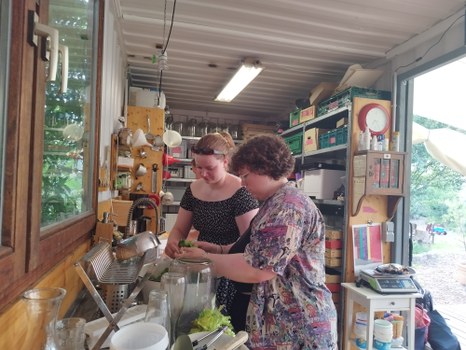
Cooking together in the Alte Gärtnerei © TUD/IO
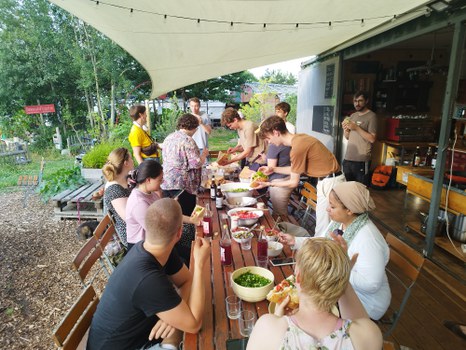
Dinner together in the Alte Gärtnerei © TUD/IO

